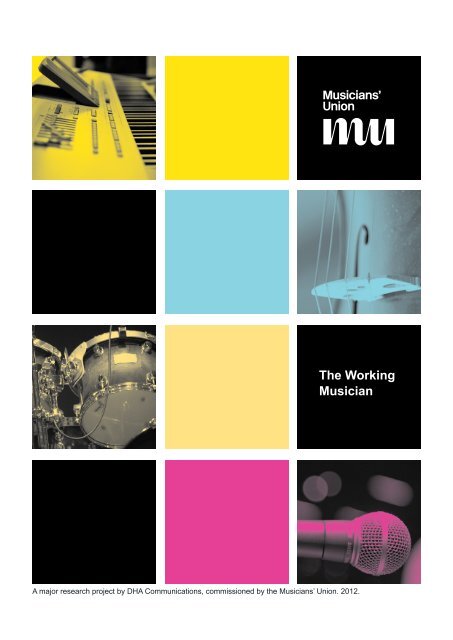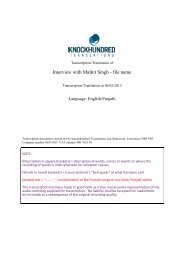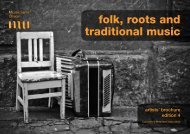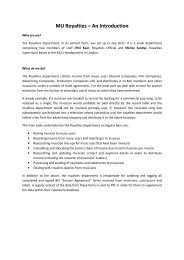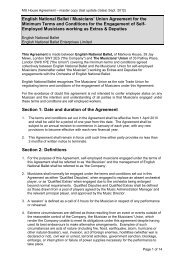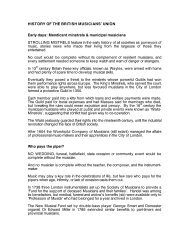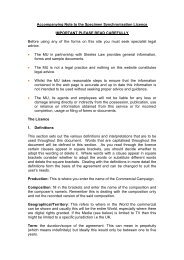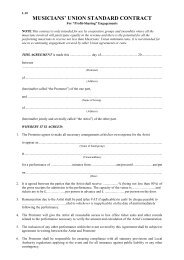The Working Musician report - Musicians' Union
The Working Musician report - Musicians' Union
The Working Musician report - Musicians' Union
You also want an ePaper? Increase the reach of your titles
YUMPU automatically turns print PDFs into web optimized ePapers that Google loves.
<strong>The</strong> <strong>Working</strong> <strong>Musician</strong>Key Findings<strong>Musician</strong>s encounter a tax andbenefit regime that is confusing,complex and is not well designedto cater for their unique workingpatterns. Designing a moreflexible and artist-friendly tax andbenefit regime would providemuch needed support forworking musicians.IntroductionIf the UK is to maintain its international positionin music and the creative arts it must sustain andnurture the creative talent that underpins its success.<strong>The</strong> achievements of the UK music industry are in largepart due to the huge body of highly qualified, trainedand experienced musicians working across genres indifferent sectors. <strong>Musician</strong>s work in a number of social,health and educational environments as teachers,therapists and community musicians in addition to theirmore traditional working roles as performers, recordingartists, composers and writers, often combining manyof these roles into one portfolio career.<strong>The</strong> size and breadth of the UK music sectoris unparalleled in Europe. However, behind thissuccessful and visible veneer, musicians in the UKare working in many less glamorous roles often withprecarious ‘portfolio’ careers marked by low incomeand uncertainty. Thousands of musicians lack the kindof workplace benefits more commonplace in other sectorsof the labour market such as holiday pay, pensions andother rights that come with regular employment.<strong>Working</strong> lives marked by low earnings potential, uncertaintyand a tax and benefit system that is ill equipped to caterfor musicians, is not an ideal environment in which tosupport UK creative talent.<strong>The</strong> <strong>Working</strong> <strong>Musician</strong> aims to provide a soundevidence base for policy makers, musicians, theirrepresentatives and the wider music industry in orderto help shape an environment where the contributionsand talent of a greater number of musicians are betterrecognised, sustained and rewarded. In this way, theUK can maintain and build on its major cultural standingin the world.<strong>The</strong> <strong>Working</strong> <strong>Musician</strong> research is based on almost2,000 responses to a UK-wide survey, in-depth interviewswith musicians and industry experts and data from a widerange of industry sources. <strong>The</strong> research, for the firsttime, assesses and explains the pay musicians receive,how they derive their income, and the pressures andchallenges they face to earn a living from their craft.This paper sets out the key findings from <strong>The</strong> <strong>Working</strong><strong>Musician</strong> research.<strong>Musician</strong>s are experienced,qualified and multi-skilled. Onlyone in five of those surveyed hadless than five years experience.Two thirds of musicians (65%)undertake four years or more offormal education and trainingwith 40% holding a degree inmusic.Pension provision is poorcompared to other professionals,employees, and even otherself-employed workers in thewider labour market. One infive employees (22%) and onein three self-employed workers(29%) in the wider labour markethave no independent pensionprovision; this rises to 65% formusicians.60%of musicians <strong>report</strong>working forfreein the past 12 months<strong>The</strong>re is no such thing as atypical musician. <strong>The</strong> blendof roles, patterns of paid andcreative work, employmentstatus and working hoursvary across musicians andacross different periods in theircareers. Developing a portfoliocareer, made up of a numberof different jobs, is a necessarycharacteristic of many musicians’careers; this invariably involvesdeveloping non-music skills suchas business, marketing, teachingand community engagement.Earnings for musicians arelow. Income levels compareunfavourably to otherprofessionals who’ve investedsimilar amounts of time andmoney into education andtraining. Over half (56%) of themusicians surveyed earn lessthan £20k and 60% of musicians<strong>report</strong> working for free in the past12 months.Over half(56%)of the musicianssurveyed earn lessthan£20kOf the musicians who receivethem, over half indicated thatroyalty payments are animportant additional incomestream; protecting and regulatingthis income source is incrediblyimportant to sustain musiciansin their careers, particularly giventhe wider context of low incomeand poor pension provision.Only 35%of musicians pay intoa pension schemePage 4Page 5
<strong>The</strong> <strong>Working</strong> <strong>Musician</strong><strong>The</strong> <strong>Working</strong> <strong>Musician</strong>FindingsThis section runs throughthe main findings from<strong>The</strong> <strong>Working</strong> <strong>Musician</strong>survey conducted inAugust, September andOctober 2012, engagingnearly 2000 workingmusicians. It supplementsthe findings with insightsfrom a cross-section ofmusicians.Before setting out how much musicians earn and fromwhere their income derives, it is important to builda picture of a musician’s career journey. <strong>The</strong> openingsections explore levels of experience, education andtraining, skills and working patterns before <strong>report</strong>ingon musicians’ income and pensions.Such context is vital if meaningful comparisons areto be made between the earnings and workingenvironments of musicians and others types of workersin the UK labour market.I have a degree in Englishand Music from Birmingham.Before that I went to theGuildhall...I went and dida teaching certificate inEnglish. I switched backto music only about 12years ago... I trained asa music therapist in 2005.(Interview, musician)Professionalmusiciansare experiencedand highlyqualified<strong>Working</strong> musicians are anexceptionally established set ofprofessionals with the vast majority(81%) having five years or moreexperience. Nearly two thirds (61%)have been working as musiciansfor ten years or more and one infive (21%) have over 30 years ofworking experience asa professional musician.Fig.1: How many years have youbeen a professional musicianin the UK?21 - 30 years16%11- 20 years24%Prior to starting out as professionalmusicians nearly two thirds (65%)had undertaken four years or moreof formal education and training,with half of these indicating that theyhad completed over seven yearsof formal education and training.A substantial number (61%) ofmusicians studied at a dedicatedmusic college, university orconservatoire with 40% holdinga degree in music.5 - 10 years20%More than 30 years21%Less than 5 years19%Fig.2: Did you attend a musiccollege / university or conservatoire?Yes61% No39%Fig.3: Do you have a degreein music?Yes40%No60%Developing instrumental skill levelsis essential for working musicianswanting to stay at the top of theirprofession and this requires practice.Over half (55%) practise theirinstrument for over 5 hours perweek and 37% practise up to 5hours per week. Practice hoursfor musicians are an essentialcomponent of their working week,almost always additional to paidwork and unrecognised by the taxand benefit system as ‘working hours’.This represents a massiveinvestment of time and resourcesin education, training and practiceby musicians learning their craft,an investment comparable toprofessional workers such asteachers, doctors, lawyers andhighly skilled craftspeople.A key point to make at this stageis that we surveyed a highly skilledand trained body of workers whoconsider themselves, primarily,as professional musicians.Page 8Page 9
<strong>The</strong> <strong>Working</strong> <strong>Musician</strong><strong>Working</strong> hoursand employment statusfor musiciansare extremely variedA musician’s preciseworking hours per weekare dependent on differentfactors and can vary fromweek to week, season toseason or year to year.Teaching, theatre and orchestral work, for example, canprovide steady regular work, sometimes even securesalaried employment status. <strong>The</strong>se are exceptionsto the norm; only 10% of musicians are full-timesalaried employees. Half of musicians have no regularemployment whatsoever. <strong>The</strong> vast majority of musicians(94%) work freelance for all or part of their income.Fig. 5: On average, what percentage of your workingweek is spent as a musician?100%75%50%25%Less than 25%9%13%11%15%52%Just over half (59%) are working full-time with 52%spending all (100%) of their working time as musicians.Only one in five are working less than 50% of theirworking week as musicians. For a sizeable minorityof working musicians earning money outside the musicindustry is necessary to maintain an income. A third ofthe musicians surveyed (34%) worked additional jobsnot connected in any way to their music careers.A <strong>Musician</strong>s’ <strong>Union</strong> survey of orchestral players,<strong>report</strong>ed in the Guardian (2006), highlights the varietyof different jobs that this highly specialised group ofmusicians take on to supplement their salaries.Work undertaken by orchestra players to supplementtheir pay packets includes aromatherapy, odd jobbing,taxi driving, childcare and cleaning. <strong>The</strong>se are highlytrained professionals at the very top of their field. Whenwas the last time your solicitor popped over to scrub thekitchen floor? 7Among the part-time musicians, over half indicated thatthey would like to be full-time. <strong>The</strong> barriers to securingsufficient opportunities for work will be even moremagnified for musicians who lack the experience andlongevity in the industry that most of our respondentshave. <strong>Musician</strong>s interviewed for this research identifiedthe uncertainty associated with the continual need tofind work and the lack of potential (paid) opportunities.<strong>Musician</strong>s with children or dependents face additionalfinancial barriers to working. <strong>Musician</strong>s earning low fees<strong>report</strong> that their fee barely covers the cost of childcare;after travel, tax and childcare there is little financial gain/incentive to work at all.… but I would say the biggest flaw isthat you cannot claim for childcare…my wife is a musician too, butbecause of the low fees she’s hadto give up… a babysitter will costyou £80 for the day, and you’ll earna £100, so after tax, NI and travelyou haven’t earned anything, you’veactually paid to go to work.(Interview, musician)Fig. 6: Do you have another job in addition to being a musician(outside of music)?Yes34%Fig. 7: If you are NOT a full-time musician – would you liketo be full-time?No I am happy working part-time18%Yes I would like to be full-time23%No66%I am already full-time59%I think it’s verydifficult and it’sgetting moredifficult. I meanlots of peopleare doingsidelines. I dotoo. I’ll be luckyif I work 15days a monthnow and youjust can’t reallysurvive like that.(Interview, musician)Page 14Page 15
<strong>The</strong> <strong>Working</strong> <strong>Musician</strong><strong>Working</strong> musicians do notattain earnings comparableto other professional groupsin the UKGiven the training, high skill levels and experienceof the musicians we have profiled, the findingson how much a musician earns are remarkable.Over half of all musicians (56%) are earning less than £20k per annum with one in five earning less than £10k fromworking as a musician. A staggering 78% of musicians are earning a gross annual income of less than £30k.Fig.8: What is your approximate gross annual income?For the one in three musicians (35%) earning between£10k and £20k, 38% are part-time, 42% have a degreeand 58% have more than 10 years experience. Toreiterate, these income levels are for experienced,full-time, qualified professionals.An important issue for musicians is that they are notgenerally entitled to progression along a pay spine likemany other professionals even when they have themore secure jobs in music. This results in earningsthat are too static over time coupled with costs such astravel, food, and childcare rising year on year. Earningsand career progression compare unfavourably withother professions in the UK - even professions, suchas teaching, that are not widely regarded as highly paid.A teacher’s starting salary, in the UK, ranges from£21k (England & Wales) to £27k (inner London). Thisstarting salary is already better than the current incomeof 56% of musicians surveyed here. After six yearsof satisfactory performance, a teacher’s salary risesto the top of this pay scale, £31k (England & Wales)to £36k (inner London); this salary is greater than theincome achieved by 78% of musicians here. As careersprogress the gap widens even further.To make matters worse, there is a common expectationfrom those engaging musicians, including publicagencies, that musicians can work for free or belowagreed rates of pay. This is an occupational hazard thatcompounds their low earning potential. Sixty per cent(60%) of musicians <strong>report</strong> undertaking unpaid work inthe past year and a sizeable minority <strong>report</strong> regularlyworking for below the agreed industry rates.Fig. 9: Thinking about the past 12 months, have youundertaken UNPAID work as a means to further yourcareer?Yes60%No40%<strong>Working</strong> musicians face a precarious and competitivelabour market characterised by a huge diversity oforganisations that commission or engage musiciansoften for very short engagements. In this context,individual musicians often take on free or under-paidwork in the hope that it will lead to paid work and betterfuture work prospects.35%21%22%12%5% 5%0 - 10k 10 - 20k 20 - 30k 30 - 40k 40 - 50k Above 50kPage 16Page 17
<strong>The</strong> <strong>Working</strong> <strong>Musician</strong>Fig. 10: Do you regularly pay into a pension scheme?Too many working musicianswill face retirement with littleor no independent pensionprovision<strong>Musician</strong>s’ low earnings make saving for a pensionextremely difficult. <strong>The</strong> variability of their workcompounds this. For many musicians the reality is thatthey will have to work beyond the age of retirement.Pension provision for musicians compares unfavourably to national figures for employees, self-employed andprofessional workers. Our findings show that 65% of musicians do not regularly pay into any pension scheme. Thisis over double the national figure for self-employed people and nearly three times the national figure for employees.<strong>The</strong> Scottish Widows UK Pensions Report (2012 8 ), looking at employees between 30 years-old and state pensionage who earn more than £10,000 per year, reveals that over a fifth (22%) of people are failing to save anything at all.A Prudential <strong>report</strong>, focusing on the self-employed, found that 29 per cent will rely entirely on the state pensionin retirement. 9No65%Fig. 11: Does any organisation / employer contribute to your pension?No75%Yes35%Yes25%Page 18I’ve made mostof my living overthe last 7 years ontouring shows...I’ve never had anycontribution toa pension by anemployer to date.(Interview, musician)In 2011, the proportion of UK employees who belonged to a workplace pension scheme was 48 per cent(ONS data). 10 <strong>The</strong> National Association of Pension Funds Workplace Pension Survey (2010) puts this figuremuch higher at 57% 11 . For workers in professional occupations, three in four have a workplace pension scheme(76% - ONS 2011). For musicians only one in four (25%) are members of a workplace pension scheme thatincludes an employer contribution. Professionals outside of music are, therefore, three times more likely to havea workplace pension that includes an employer contribution.Page 19
<strong>The</strong> <strong>Working</strong> <strong>Musician</strong>Collecting societies license music and collect royalties from a number of sources; television and radio broadcasts,music performed live at gigs, concerts and theatres, and businesses and other organisations that use music. <strong>The</strong>serange from bars, nightclubs, shops and hotels to offices, factories and gyms. <strong>The</strong>y then distribute these royalties totheir members who hold the rights to the recorded music and compositions. Over half of the musicians who receiveroyalty payments <strong>report</strong>ed them as being ‘economically valuable’.Royalties from compositionsand recordings are importantadditional sources of incomefor working musiciansRoughly half of all musicians belong to one of the major collecting societies. In the UK, PRS for Music is thecollecting society for songwriters or composers of songs/music and Phonographic Performance Ltd. (PPL)is the collecting society for performers on sound recordings.Fig. 13: Are royalty payments from copyright economically valuable to you?Yes24%No20%I don’t receive royalty payments56%Fig. 12: Are you a member of a collecting society?38%33%49%<strong>The</strong>se payments can add up to an important additionalrevenue stream for musicians through sales andpublic broadcasts. This can aggregate over time andsupplement the low incomes <strong>report</strong>ed above.To focus on the album we’reliving in ways that are fairlyhand to mouth, and notsustainable for more than afew months in my opinion...We did get a PRS paymentrecently that will nearlycover all our rent paymentsfor a month. That was a nicesurprise.2%(Interview, musician)Performing RightsSociety for Music(MCPS + PRS)PhonographicPerformance Limited(PPL)Other,please specifyNone of theabovePage 20Page 21
<strong>The</strong> <strong>Working</strong> <strong>Musician</strong>Conclusions<strong>The</strong> <strong>Working</strong> <strong>Musician</strong> research has shone a light ona highly educated, trained, skilled and experiencedset of musicians who, despite such high levels ofqualifications, skills and experience face an uncertainand precarious working environment marked by incomelevels and benefits that are not comparable to similarsets of workers elsewhere in the UK labour market.Pension provision and annual levels of income areparticularly poor when compared to other professionalgroups in the UK.<strong>Musician</strong>s have highlighted the challenges they facefrom their experiences of the tax and benefit systemand in accessing and benefiting from financial serviceprovision in ways other working people take for granted.More imaginative ways need to be found to ensuremusicians and creative workers generally get a moreequitable deal from both the financial services industryand the tax and benefit system.<strong>The</strong> major question the findings of this research posesis; for how long can the UK maintain a pool of worldbeating musicians and attract new talent from allbackgrounds given the earnings potential of the averagemusician and the spiralling costs associated witheducation, training and sustaining a musician’s career?<strong>The</strong> Research<strong>The</strong> findings presented above are predominantly basedon the responses to an online survey that wasoperational in August, September and October 2012.Email invitations were sent to 20 000 <strong>Musician</strong>s’ <strong>Union</strong>members; the survey was also promoted in a numberof newsletters and websites that connect in some wayto working musicians in the UK.1,966 working musicians in the UK completed thesurvey; 90% of these were members of the <strong>Musician</strong>s<strong>Union</strong>. <strong>The</strong> survey findings were supplemented with 25semi-structured interviews with individual musicians witha mix of different genres and roles, plus semi-structuredinterviews with eight officials of the <strong>Musician</strong>s’ <strong>Union</strong>.One further interview was carried out with a representativefrom the BPI with expertise in copyright and piracy.Acknowledgementsand CreditsCommissioned by the <strong>Musician</strong>s’ <strong>Union</strong>.Researched and produced by: DHA CommunicationsResearch Team• Erin van der Maas Lead Researcher• Patricia Hallam Researcher• Daniel Harris Director<strong>The</strong> research team would like to thanks the 1,966musicians who took the time and effort to respond tothe online survey. We would also like to thank the valuedinput from the officials of the <strong>Musician</strong>s’ <strong>Union</strong> plus theindividual musicians who were interviewed in personor over the telephone.Endnotes1Facts from the BPI Yearbook 2010, 2011 & 2012 (British Phonographic Industry / British Recorded Music Industry)2Foreign and Commonwealth Office website (20/10/2012) - http://www.fco.gov.uk/en/about-us/what-we-do/publicdiplomacy/great-campaign/music3PRS for Music quoted on BBC News - http://www.bbc.co.uk/news/entertainment-arts-200042254Association of British Orchestras (ABO) Key Facts 2011. Income data includes public investment, philanthropy,tours and performances, revenue from recordings and other sales but figures do not include the BBC orchestras.5UK Music (2010) <strong>The</strong> Contribution of Music Festivals & Major Concerts to Tourism in the UK – Destination: Music<strong>report</strong>www.ukmusic.org/assets/media/UK%20Music%20-Music%20Tourism.pdf6UK Music (2010) Liberating Creativity. p. 117Anna Price (2006) ‘Pit of despair’. <strong>The</strong> Guardian, Thursday 2 February.8http://www.scottishwidows.co.uk/about_us/media_centre/<strong>report</strong>s_pensions.html9Prudential Research cited in - http://www.pcg.org.uk/cms/index.php?option=com_content&view=article&id=8707&catid=746:freelancing-news&Itemid=99510Office for National Statistics (ONS) 2011 Annual Survey of Hours and Earnings: Summary of Pension Results (SOC2000) - http://www.ons.gov.uk/ons/dcp171778_256109.pdf11http://www.napf.co.uk - <strong>The</strong> ONS survey does not include group personal pensions or stakeholder pensionsPage 22Page 23
Commissioned by the<strong>Musician</strong>s’ <strong>Union</strong>.Researched and producedby: DHA Communications


